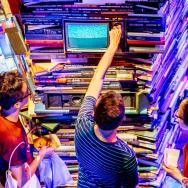The boundaries between art, design, science and technology are disappearing in a digital world. Today, artists use algorithms, scientists rely on visualization and designers are often focused on helping people navigate new technologies.
At the University of Chicago, the disciplines come together at the Media Arts, Data and Design Center, creating a new collaborative space for experimentation, discovery and impact. The MADD Center will support work by faculty, other academic appointees, students, staff and community partners through cutting-edge technologies. The 20,000-square-foot center in the John Crerar Library opened Feb. 25.
“Design, as a field, now encompasses the sum of human interactions with the devices, environments and communities that shape daily life,” said David J. Levin, Senior Advisor to the Provost for Arts. “The MADD Center gives the University of Chicago a space to address these radical changes, assess their wide-ranging consequences, and comprehend the ways that perception, sensation and experience are being transformed.”
At the MADD Center, there are opportunities to create, study and learn about critical technologies driving both culture and science, including video games, virtual and augmented reality, data visualization, and digital fabrication. The MADD Center brings together the College, Division of the Humanities, Division of the Physical Sciences, UChicago Arts and the UChicago Library.
The MADD Center will host five resource labs:
- An expanded Computer Science Instructional Lab, providing hardware and software for training and education;
- The Hack Arts Lab, an open-access digital fabrication, prototyping and visualization facility;
- The new Weston Game Lab, offering expanded resources for the study, play and development of analog, electronic, virtual and online games;
- The Research Computing Center Visualization Lab in the Crerar Library’s Kathleen A. Zar Room, providing new data visualization technology;
- The UChicago Library’s new GIS Hub, enabling geospatial research and learning activities by providing access to geographical information systems software and hardware and an expert GIS and maps librarian who offers consultations and training.
At the MADD Center, classroom and studio spaces support the teaching of Media Arts and Design and Media Aesthetics in the College, electronic music in partnership with CHIME Studios in the Department of Music, and virtual reality and other media courses as part of the new Media Arts and Design minor in Cinema and Media Studies. In addition, the MADD Center will provide new opportunities for further collaboration with the Logan Center for the Arts, the Polsky Center for Entrepreneurship and Innovation, and many others.
“I am excited about the new opportunities students and faculty in the College and the Humanities will have to work with colleagues in computer science and other areas as we continue to develop new courses in Media Arts and Design and support the many interests of our students and faculty in this area,” said Christopher Wild, Deputy Dean of the College and Humanities Division.
Collaboration across creative forms
The open floor plan and close proximity of the MADD Center labs is designed to create opportunities for crossovers and collaboration. Students designing a new board game can create prototypes on the 3D printers at the Hack Arts Lab, while researchers working with the GIS Hub might reveal new insights by visualizing their data on Research Computing Center resources. The MADD Center is located near the new Department of Computer Science offices and laboratories, a science librarians’ research and teaching suite, and the Library’s collections and study spaces at a renovated Crerar Library—creating new, interdisciplinary opportunities across divisions.
“As our world becomes increasingly digital, designers and artists need to become more engaged with technology and technologists need to become more fluent with design, media and the arts,” said Michael J. Franklin, the Liew Family Chair of Computer Science. “By co-locating a critical mass of tech-savvy students and faculty with diverse skills and interests across these varied domains, we will facilitate robust dialogue and collaboration as our disciplines continue to co-evolve.”
Gaming, UChicago-style
The MADD Center is envisioned as a place for a group of students dissecting the structure of a classic Nintendo game, or sketching out the visual design for a new card game that teaches high school students about teen pregnancy. A cornerstone of the new center, the Weston Game Lab, will provide a vibrant new space at UChicago for the research and design of the world’s fastest-growing cultural and aesthetic form: games.
The Weston Game Lab is supported by a gift from Dr. Shellwyn Weston and Bradford Weston, JD’77. Within the Lab, students, faculty and staff will collaborate on the research and development of games that produce social impact or experiment with form. Participants also will be able to research the history of games from technical and theoretical perspectives with the Library’s collection of video games and the Logan Center’s collection of consoles, attend workshops that afford new development skills, and organize collaborative groups for game-based experiments.
“Video games in recent years have become an immensely popular medium and multi-billion-dollar industry,” said Patrick Jagoda, Associate Professor of English and Cinema & Media Studies and director of the Weston Game Lab. “For cultural, psychological and sociopolitical reasons, we need rigorous academic study, across both humanistic and social scientific disciplines. I’m interested in growing a culture of thoughtful, ethical and experimental game design for ends other than entertainment that includes interdisciplinary teams of faculty, staff and students. I think the University of Chicago can really shine in this space.”

